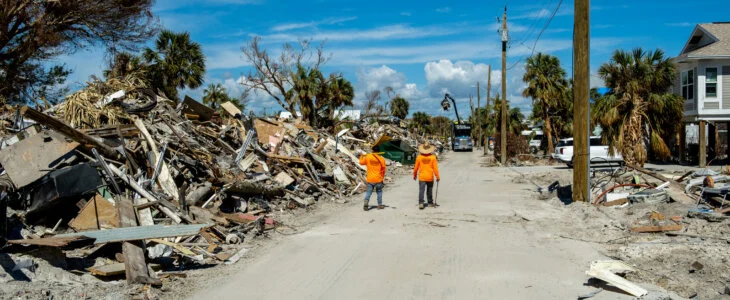Hurricanes are an unfortunate reality in Coral Springs, often bringing severe property damage and disruption to daily life. Dealing with hurricane damage can lead to legal complications for tenants and landlords. Understanding your rights and responsibilities in the aftermath of a hurricane is essential for both parties to navigate this challenging time. Continue reading to learn more about your legal options after a hurricane from Tomlinson Law Group.
Landlords’ Responsibilities After Hurricane Damage
In Florida, landlords are legally obligated to maintain a habitable living environment for their tenants. This requirement, often called the “implied warranty of habitability,” means that the rental property must be safe and livable. After a hurricane, landlords must address critical issues like roof damage, broken windows, or water intrusion that could affect the tenant’s ability to safely occupy the home.
However, landlords are not automatically responsible for every type of damage. The type of damage, its cause, and what is covered under their insurance policy will determine their obligations. If the damage results in the home being uninhabitable, Florida law requires landlords to take steps toward repairing the property as soon as possible.
If significant repairs are needed, the landlord might need to:
- Provide Temporary Relocation: If the rental unit is temporarily uninhabitable due to hurricane damage, landlords may need to assist tenants in finding temporary accommodations or reduce the rent until repairs are completed. This could be outlined in the lease or local laws.
- Terminate the Lease: In extreme cases where the property is entirely destroyed, or repairs are impossible within a reasonable time, both landlords and tenants may have the legal option to terminate the lease. Florida Statute §83.63 allows either party to terminate the lease if the premises are destroyed or become uninhabitable through no fault of the tenant.
Tenants’ Rights After a Hurricane
Tenants, on the other hand, also have specific rights when it comes to hurricane damage. As a tenant, if the property you rent is damaged during a hurricane, you can expect your landlord to handle the repairs in a timely manner. However, it’s important to understand what damages your landlord is responsible for versus those that fall under your own renter’s insurance policy.
- Rent Reduction or Abatement: If the hurricane damage leaves the rental unit uninhabitable, tenants may be entitled to a rent reduction or abatement until repairs are made. This would apply if the damage makes it impossible to live on the property, such as a destroyed roof or severe flooding. Keep in mind that landlords are not responsible for tenant relocation costs unless otherwise stated in the lease.
- Renter’s Insurance: While landlords typically have insurance that covers damage to the building itself, tenants are responsible for insuring their personal belongings. A renter’s insurance policy can provide coverage for any personal property that is lost or damaged during the hurricane, as well as temporary living expenses if the tenant must relocate during repairs.
- Termination of Lease: In situations where the property is entirely uninhabitable, and repairs will take a long time, tenants may have the option to terminate the lease. Florida law allows tenants to legally break their lease if the rental unit becomes unlivable due to a natural disaster and repairs cannot be completed promptly.
Disputes Over Repairs
Disputes between landlords and tenants about the extent of damage, the timeline for repairs, or each party’s obligations are common after a hurricane. In many cases, these disputes can escalate into legal battles if either party feels the other is not fulfilling their duties.
- Landlord Fails to Make Timely Repairs: If a landlord fails to address necessary repairs after hurricane damage, tenants have the right to take legal action. In Florida, tenants may be able to withhold rent or pay for repairs themselves and deduct the cost from the rent. However, these actions must follow strict legal guidelines, so tenants should consult an attorney before proceeding.
- Tenant Negligence: Landlords can claim that a tenant’s actions (or inaction) contributed to the damage. For example, if a tenant failed to take reasonable steps to protect the property before the hurricane, such as ignoring evacuation orders or leaving windows open, the landlord may attempt to hold them partially responsible for the repairs.
Insurance Claims and Legal Support
Navigating insurance claims after a hurricane can be a complex process for both landlords and tenants. Insurance companies may deny claims, underpay for repairs, or delay payouts, leaving both parties in difficult positions. This is where legal support can be crucial.
At Tomlinson Law Group, we have extensive experience handling insurance disputes, particularly in first-party claims where policyholders—landlords or tenants—must file for damages with their insurance companies. Whether it’s damage to the building or lost personal belongings, we help our clients ensure they receive the compensation they’re entitled to under their policies.
Some common challenges we address include:
- Denied Claims: Insurance companies may deny claims for various reasons, such as claiming the damage was caused by a pre-existing condition or by the tenant’s negligence. We help appeal these decisions and gather additional evidence if needed.
- Underpaid Settlements: If the insurance payout doesn’t cover the full cost of repairs or replacement, we can assist in negotiating for a higher settlement that reflects the actual damages.
- Delayed Payments: Insurance companies are required to process claims promptly, but delays are common. We help push insurers to make timely payments so that repairs can be completed as quickly as possible.
Tomlinson Law Group Can Help
In the wake of a hurricane, both tenants and landlords face significant legal challenges. Knowing your rights and obligations, as well as how to navigate insurance claims, is essential. Whether you’re a tenant struggling with uninhabitable conditions or a landlord dealing with extensive property damage, understanding your legal options can help you recover faster.
At Tomlinson Law Group, we are here to guide you through the process and ensure your rights are protected. Contact us today to discuss your situation and explore your options.


